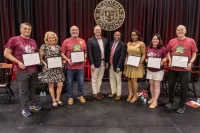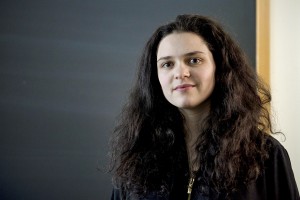
2014 Watson Fellow Simone Schriger
Simone Schriger, a senior psychology major from Los Angeles, is one of two Bates seniors to be awarded a 2014 Watson Fellowship.
Schriger joins 42 other college students from across the country, including her Bates classmate Brian Kennedy of Port Washington, N.Y., who have received this prestigious grant that supports a year of travel and research outside the United States.
A program of the Thomas J. Watson Foundation, the Watson Fellowship supports a year of international exploration in any field for select graduating college seniors. Each fellow is awarded $28,000 for 12 months of travel as well as college loan assistance as applicable and an insurance allowance.
Recipients come from select private liberal arts colleges and universities across the U.S. This year’s 43 recipients were selected from a pool of nearly 700 candidates overall and 150 finalists.
Schriger plans to research the practice of donating human body parts and products: specifically, breast milk, hair, blood and kidneys. She will travel to India, South Africa and Costa Rica in seeking to understand differing motivations for “parting with one’s parts” and the cultural contexts that affect those motivations.
In her interviews with people involved in myriad ways with corporeal donations, she will also investigate attitudes toward the commodification of these goods. “There’s a global network of these parts,” she says.
“One of the things that I’m trying to figure out is how that has changed and how much our view of it, as something that’s pretty normal, is representative of others’ understanding of it in different nations and cultures.”
Schriger credits her time at Bates as instrumental in their success at competing for the Watson.
Guidance from psychology faculty was crucial in helping prepare Schriger for a successful Watson application. “The individual attention they provided was instrumental in developing confidence and independent working habits,” Schriger says.
Parting with our parts
Schriger’s research focus for her Watson year is driven by the tension between two opposing forces in attitudes toward body parts. Things like blood, milk, hair and kidneys are both fundamentally personal — as personal as anything can be aside from one’s thoughts — and subject to commodification, the exact opposite of personal, because of their value to human healthcare.
Drawing on skills honed while conducting research in Chile for her Bates senior thesis project, Schriger will apply a formal ethnographic approach to conducting interviews with people from all walks of life. She is interested in the psychology and the cultural significance of the giving or sale of body parts and their use.
“How do these parts gain and lose meaning when they are removed from us?” she wonders. “How do they serve as physical embodiments of who we are?”As she considers a career in medicine, Schriger anticipates that her Watson experiences will prepare her to bring a humane, compassionate approach to working with patients.
In India, her work will include a visit to the Hindu Venkateswara Temple in Tirumala, where each day some 75,000 devotees participate in the practice of tonsure — the shaving of one’s head for religious purposes — which generates an annual $6 million in revenue from hair sales for the temple.
Kidney donation will be the emphasis of Schriger’s time in South Africa and Costa Rica. In the latter nation, which has one of the world’s highest rates of live organ donation, a hospital known as a transplant center will be among her stops.
Her South African destinations include Cape Town, where she will visit the hospital where Dr. Christiaan Barnard performed the world’s first successful heart transplant and where now, almost 50 years later, another surgeon performs controversial kidney transplants on matched HIV positive donors and recipients.
Schriger’s travels will also include visits to breast milk banks and blood donation organizations.
An accomplished photographer, Schriger also plans to “experiment with journalism, poetry and fiction as I convey my discoveries to a wider audience.”





